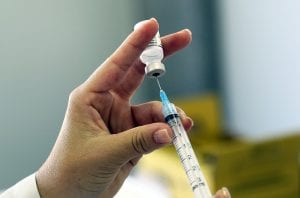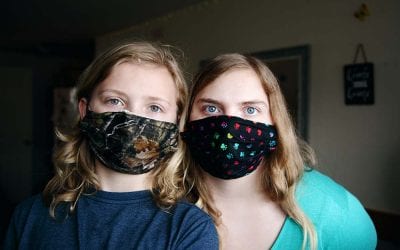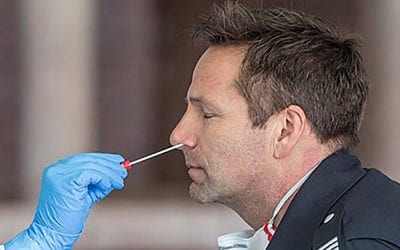With the recent COVID-19 upsurge, is pandemic travel more dangerous, particularly for those not fully vaccinated against the deadly virus?

COVID-19 Vaccination
Some Americans seem to celebrate the death of the COVID-19 pandemic. More than 20,000 new cases daily and more than 300 dying of the virus each day in the US, make it clear that the pandemic continues. And, the pandemic is surging. While those statistics are better than the dark days of mid-winter, the current upsurge in cases and deaths alarms travelers. They all tell the same story. To travel safely, vaccinations, wise destination choices, and face masks are essential for safer pandemic travel.
When asked if it was safe to travel at this time, Dr. Leana Wen, visiting professor of Health Policy and Management at George Washington University, where she is currently a Distinguished Fellow in the Fitzhugh Mullan Institute for Health Workforce Equity, and Nonresident Senior Fellow at the Brookings Institution, said that there are two major factors; vaccination status and each traveler’s destination.
Dr. Leana Wen believes that if you’re fully vaccinated you can enjoy safer pandemic travel. For those not fully vaccinated, avoid travel.
Dr. Wen said, “If you’re fully vaccinated, unless you are severely immunocompromised, you are well protected against COVID-19.” And, you can resume activities you enjoy again, including travel. She finished that thought by saying that those who are not yet vaccinated against COVID-19 should “refrain from nonessential travel,” both domestically and internationally.
Today, the COVID-19 Delta variant is becoming the dominant COVID virus in much of the world, including the US. Dr. Wen’s statement about vaccination has become even more pointed, important, and frankly imperative. In fact, a small study published on July 7, 2021, “Viral infection and transmission in a large well traced outbreak of the Delta SARS-CoV-2 variant” indicated that it spreads 225 percent faster than the original virus. Their analysis showed that, on average, the Delta viral load was as much as 1,000 times higher for people infected with it, compared to those infected with the original virus.
Yale Medicine states that the Delta variant of COVID is at least 50 percent more contagious than the original COVID virus.
Yale Medicine, the clinical practice for the Yale School of Medicine, Yale University, in a recent report stated that the Delta variant spread faster than the original COVID-19 virus. It’s also at least 50 percent more contagious. The report stresses that “People who have not been fully vaccinated against COVID-19 are most at risk.”
We know that the vaccine isn’t 100 percent effective. No vaccine is 100 percent effective, but statistical analysis shows that fewer than 0.01 percent of fully vaccinated Americans have been confirmed at having the COVID disease. That’s an amazing record of real-world effectiveness for the COVID vaccines. Think about it. Fewer than 0.01 percent of fully vaccinated people get “break-through” COVID-19 infections. Yet young, otherwise healthy Americans are getting COVID these days. They all seem to have just one characteristic in common: Virtually every American who is getting infected with COVID-19 and needing hospitalization and/or dying hasn’t been vaccinated for the disease. That’s an astounding statistic.
Along with vaccination status, the other major factor Dr. Wen mentioned is the destination. Clear localization trends in COVID-19 infection break-outs have emerged across the U.S. and the globe. The localized infection statistics mirror vaccination rate statistics. Locales with high infection rates invariably reflect the proportion of people who have been fully vaccinated. The higher the vaccination rate, the lower the number of new COVID-19 infections in that area.
For safer pandemic travel, reconsider traveling to high COVID-19 infection areas.
Clearly, if your proposed travel plans will take you to an area with high COVID-19 infection rates, you should reconsider those plans. Don’t take those trips unless they are absolutely essential, even if you’re fully vaccinated. For U.S. states and international destinations, it’s relatively easy to find out the statistics of new COVID-19 infections, deaths, and vaccination rates. For Americans, for example, I recommend the websites of Johns Hopkins for the latest COVID-19 infection and vaccine data so you know where you should avoid traveling and where it should be relatively safe to go.
Once you’ve decided on safer pandemic travel by becoming fully vaccinated and choosing your destination wisely, it’s time to consider an effective prevention device to use, necessary for essential added protection. Wear a mask.
We know from numerous peer-reviewed studies that properly chosen and properly worn face masks have substantial efficacy against COVID-19. In the prestigious publication Nature, a report discusses the known evidence about the efficacy of face mask usage to prevent the transmission of and infection from COVID-19.
The scientific analysis says that face mask use is highly capable of cutting down both COVID-19 transmission and catching the virus.
The article points out that “…science supports using masks, with recent studies suggesting that they could save lives in different ways. Research shows that they cut down the chances of both transmitting and catching the coronavirus. Some studies hint that masks might reduce the severity of infection if people do contract the disease.”
Not all masks are created equal. Face masks that work well are medical/surgical masks, N95 respirator masks, and multi-layer cloth masks. Masks with valves are not considered effective.
Always wear a face mask as required by law and/or regulation. I recommend wearing a face mask when inside in poorly ventilated areas and crowded rooms, even if you’re vaccinated. I’m never without a mask in elevators and crowded entranceways, for example.
In the US, more than 34 million have contracted COVID-19 and more than 624,000 have died from the dread virus. Follow the three COVID-19 prevention methods discussed above — vaccination, safe destination choices, and face mask usage. By doing so, you’re far more likely to come back from your travels healthy, rather than if you haven’t used these methods.
READ ALSO:
10 travel theft prevention tips to make you secure
Hilton ends daily housekeeping. Will it endanger guests’ health and safety?
After many years working in corporate America as a chemical engineer, executive and eventually CFO of a multinational manufacturer, Ned founded a tech consulting company and later restarted NSL Photography, his photography business. Before entering the corporate world, Ned worked as a Public Health Engineer for the Philadelphia Department of Public Health. As a well known corporate, travel and wildlife photographer, Ned travels the world writing about travel and photography, as well as running photography workshops, seminars and photowalks. Visit Ned’s Photography Blog and Galleries.



